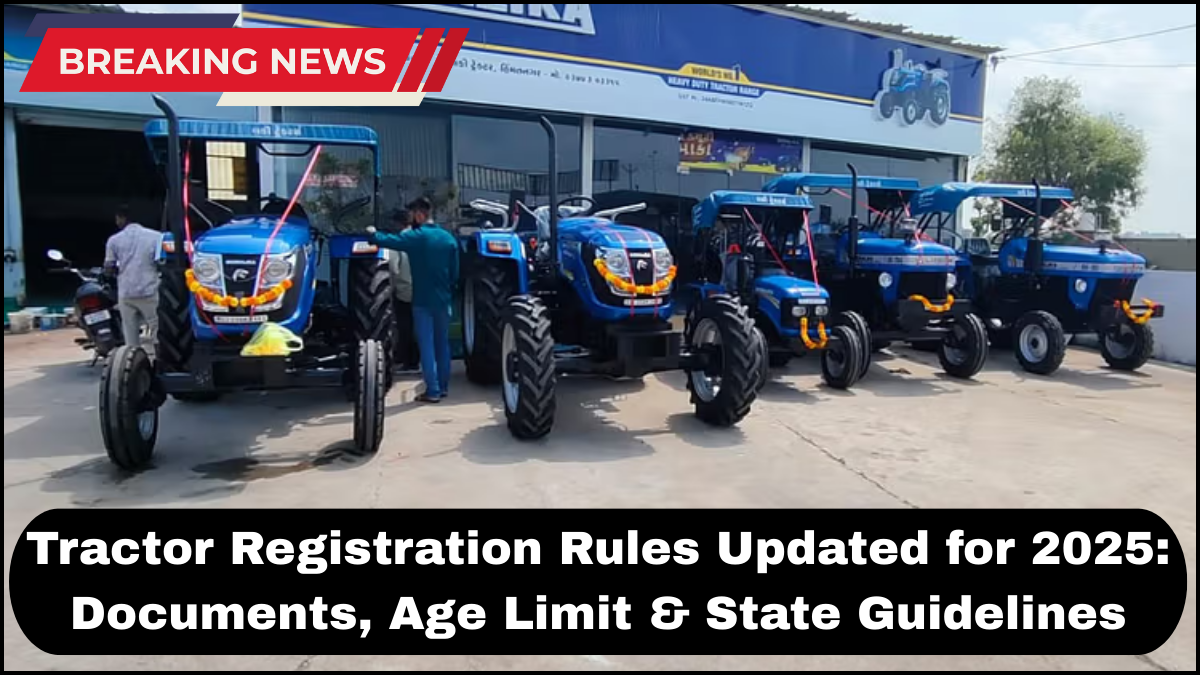As India pushes toward modernizing its agricultural infrastructure, the government has revised the Tractor Registration Rules 2025 to make them more streamlined, secure, and consistent across states. These changes aim to simplify the process for farmers while reinforcing accountability in the agricultural vehicle sector. Whether you’re a first-time tractor buyer or updating your existing registration, understanding these new norms is essential.

Below is a detailed breakdown of what’s changed in 2025, which documents are required, the new age criteria, and how agri vehicle RTO India regulations vary state by state.
Updated Documents Required for Tractor Registration (2025)
The revised rules now require stricter documentation to prevent fraud and ensure all agri vehicles are properly tracked. Here’s what you’ll need in 2025 to register a tractor under the new guidelines:
-
Proof of Identity: Aadhaar Card, Voter ID, or Passport
-
Proof of Address: Electricity bill, Ration card, or Rental agreement
-
PAN Card: Mandatory for ownership verification and taxation
-
Sales Invoice: Issued by the dealer, including GST details
-
Form 20: Application for registration of a motor vehicle
-
Form 21: Sale certificate from the dealer
-
Form 22: Roadworthiness certificate from the manufacturer
-
PUC Certificate: Pollution Under Control certificate
-
Insurance Document: Valid third-party insurance at minimum
-
Photographs: Recent passport-size photos of the applicant
-
Bank Loan Documents (if applicable): Required for hypothecated vehicles
The RTO may ask for additional documents depending on local state mandates, especially in sensitive border districts.
New Age Limit Guidelines for Tractor Ownership and Driving
One of the notable changes in the Tractor Registration Rules 2025 is the stricter enforcement of age restrictions for both owners and drivers.
-
Minimum Age to Drive: 18 years (no exceptions).
-
Minimum Age to Register a Tractor: 18 years (must be legally able to enter into a contract).
-
Driving License Requirement: A valid LMV (Light Motor Vehicle) license with tractor endorsement. For commercial/agricultural use, a specific “Agri Vehicle” category may be required depending on the state.
Unlicensed driving is now penalized more harshly, with fines ranging between ₹5,000 to ₹15,000, and repeat offenses may lead to license suspension.
State-Wise Variations in Agri Vehicle RTO India Policies
Although the Central Motor Vehicles Act provides a unified framework, states have flexibility to impose additional requirements. Here’s how agri vehicle RTO India guidelines may vary across regions in 2025:
-
Punjab & Haryana: Additional subsidy checks are enforced. Farmers must submit land ownership proof for availing benefits.
-
Maharashtra: Biometric verification of the tractor owner is mandatory at the RTO office.
-
Tamil Nadu: Digital-only applications are being implemented through the RTO portal.
-
Uttar Pradesh: Local bodies may require Gram Panchayat certification for tractors used on village land.
-
Rajasthan: Environmental clearance for tractors operating in mining zones or near forests.
Always check with the local RTO office for state-specific clauses before beginning the registration process.
Technological Integration and Smart Card RCs
From 2025 onward, all new tractor registrations will be issued smart card-based Registration Certificates (RCs). These cards include embedded chips that store:
-
Vehicle chassis and engine number
-
Owner details
-
Registration history
-
Fitness and insurance data
This digitization helps streamline enforcement, making it easier for authorities to verify vehicle legitimacy during checks.
Temporary Registration for Agricultural Vehicles
Dealers are now allowed to issue temporary registrations valid for up to 30 days, allowing farmers to begin using their tractors while permanent registration is pending. This provision is especially useful during peak harvest or sowing periods.
However, tractors operating under temporary registration must display clearly marked temporary plates and follow all road and safety regulations.
Re-Registration and Transfer of Ownership
Transferring a tractor from one state to another or selling it to another individual now involves a cleaner, more digitized trail. The new process includes:
-
Submission of No Objection Certificate (NOC) from the original RTO
-
Updated insurance reflecting the new owner
-
Biometric authentication during the transfer
-
Fresh PUC and fitness certificates
Failure to update registration details after transfer may lead to penalties and disqualification from subsidies.
Key Takeaways
-
Tractor Registration Rules 2025 are stricter and more uniform nationwide.
-
Updated documents and biometric authentication are now the norm.
-
Age limit and licensing requirements are being strictly enforced.
-
States still retain flexibility for region-specific clauses.
-
Digital RCs and smart cards will replace paper formats entirely.
FAQ: Tractor Registration Rules 2025
Q1. Can a 17-year-old with a learner’s license drive a tractor for farm use?
A: No. Under the 2025 rules, only individuals aged 18 and above with a valid LMV or Agri Vehicle license can legally drive a tractor.
Q2. What happens if I don’t register my tractor within 30 days of purchase?
A: Delays can lead to fines up to ₹5,000 and may affect your ability to claim agricultural subsidies.
Q3. Are there any exemptions for small landowners or marginal farmers?
A: Some states offer partial registration fee waivers or relaxed documentation if verified by local authorities, but registration itself remains mandatory.
Q4. Can I register my tractor online?
A: Yes, most states now offer online registration through the VAHAN portal or their respective state RTO websites.
Q5. Do I need a commercial license if I use my tractor for contract farming?
A: Yes. If the tractor is used beyond your own land or rented out, you may need a commercial Agri Vehicle endorsement depending on your state.
click here to learn more